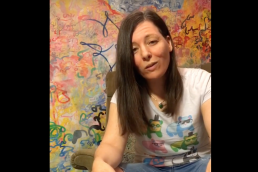by Cinzia DuBois
Transcript:
“*dance music* So today’s topic is a lot more serious, so I thought I’d lighten it up a little before I got started. Today we’re going to talk about loneliness, and if anyone can talk about loneliness, it’s the person talking to herself in front of a camera, alone in her flat, am I right? A certain degree of loneliness is inevitable in life, especially when it comes to University. Leaving home and being far away from friends and family, or relocating to a new country with a new culture can leave people feeling pretty lonely. But usually the feeling subsides once you settle into university and life in general. You acclimatise, like the British public did when the Great British Bake Off moved from BBC to Channel 4, or how the Earth acclimatised to human impact and the effects of mass global warming. Wait…
But unfortunately loneliness isn’t so easily overcome by many. Loneliness is more than just feeling and being alone or wishing you had company. It’s the experience of feeling totally alien, unable to understand how you assimilate into the world around you and the people you share this space with. And the answer isn’t clear. It’s not as easy as joining a society or talking to the person you’re sitting next to in a lecture. This can work for some but not for everyone. I’ve been in crowded rooms, in libraries and in relationships and still felt lonely. That’s because loneliness is a feeling, not a circumstance.
Mental health issues can often cause students to isolate themselves from fellows or even stop them approaching lecturers or counsellors. Social anxiety, depression, eating disorders and many other common mental health issues cause students to spend their entire university lives not-socialising, never joining any societies or even sitting by someone in a lecture or seminar. The effects of intensifying university workloads also causes people to become isolated, dedicated to the gravity of work their studies require, and Masters and PhD students are the biggest victims of isolation. Their research dominates their lives, and their topics are so micro-niche that they have nobody to talk to about them. In doctoral research you are, by definition, the only person working on your topic. The exhausting pressure, immensity of work and stresses of funding and time restraints cause many PhD candidates to have breakdowns, many drop out, and countless students in their desperation turn to using unprescribed medications in order to overcome issues of insomnia, anxiety or to help pull all-nighters.
And during these dark time, socialising with people is usually the last thing you want to do and I get it. When I was doing my degrees, university was my life and I spent my entire academic life in isolation. I never socialised or joined any clubs or societies. I didn’t want to risk anything jeopardizing my research and academic potential. For many, their academic pursuits are the only reason they are at university, and therefore they dedicate their whole life and soul investing in them.
Like I said before, being alone and feeling lonely aren’t the same thing. Everyone enjoys having some alone time. Loneliness, however, is what happens when you don’t enjoy the time you’re having with yourself, and the only way to cure this is to have a relationship with yourself. Many people spend their whole lives avoiding spending time with themselves for various reasons. Maybe it’s because they don’t like being left to their own thoughts, or maybe they have an issue with themselves. But, the most likely reason is that they don’t appreciate themselves because they don’t know how to or why. The times when people feel loneliest are the times when they, ironically, need to spend more time alone with themselves, and learning about themselves. We’re taught from a young age that talking to yourself is the first sign of madness, but ironically, because we haven’t learnt how to have meaningful conversations with ourselves, we end up in unhealthy mental environments.
“But Cinzia, does this mean that we all have to sit in front of cameras and talk to ourselves in isolation like you do for fun?” No my beautiful friend, I will never allow you to become as weird as I am. I’ve already made a video about self-love which I’ll link in this video. But what’s important to know now is that if your mental health is preventing you from socialising and breaking some immediate barriers against loneliness, then you need to focus on having a relationship with yourself. What’s great about this is that you can do this in the comfort of your own bedroom. “But Cinzia, how do I create a relationship with myself?” My beautiful friend, this question is redundant. You already know how to treat people well; you’ve shown it in your life to your friends, family and colleagues. So now it’s time to shoot some of that treatment in your own direction. It’s time to become your own good friend. Invest time, kindness, good health and strength into yourself. Cultivate realistic, optimistic behaviour: say the words you’d like to hear from someone else to yourself. They are no less valid coming from your mouth than anyone else’s. If anything, they’re more valid, because they have investment behind them.
Ideally, socialising or attending counselling are things one should do when overwhelmed with loneliness, but mental health issues and academic stresses are extremely complex. So, make a coffee date with yourself once a day. Concentrate your energy and time into getting to know yourself in the same way you would a friend or someone interesting you’ve just met. You’re an interesting person, allow yourself to speak. Hear yourself talk. Listen to your own feelings and opinions. Discover more about yourself in the same way you would when meeting someone new. Would you spend your entire coffee date with a friend talking only about your research? If you would then may I give you some friendly advice? Maybe not? Talk about something you’re both passionate and interested in. Got a subject in mind? Good, spend your coffee date with yourself exploring that topic instead. Also, if you met a friend for coffee, would you spend the entire time on your phone scrolling through instagram when they’re sitting opposite you? Of course not, you’re not a douche. So don’t spend this time with yourself that way either. FOMO is real, and social media painfully magnifies a distorted alternative lifestyle to those suffering from loneliness. So cut your social media usage waaaay down, or out completely if you’re able to.
If you have sad thoughts it’s important you share them with yourself. Record yourself, write them down, then read them. Then ask yourself, if these words were coming from someone else, what advice would you give? It’s important when you’re feeling lonely to acknowledge how you’re feeling, and talk yourself through it. Give time to yourself to reflect on what you’re feeling. These very basic, philosophically grounded techniques of exploring the self will actually help you build a stronger relationship with yourself, and make the time you spend with yourself less distressing. Find ways to enjoy your own company, and appreciate the time you have with yourself. Get to know yourself better, take time to enjoy your own company. Rather than wish someone would give you their time, empathy and compassion, give yourself these things. When you’re ready, then hopefully you’ll be able to seek guidance from a professional or close friend. But never think you’re alone: you always have yourself. That not a negative thing, if you think about it in abstract, that’s actually really freaking amazing. You’re pretty phenomenal, whether you’re able to see that right now or not. And in life, you can’t break up with yourself or avoid yourself, so the best thing you can do is make sure the relationship that you have with yourself the best relationship you ever have.
If you like what we’re doing on this channel you should subscribe and consider joining the Rebelleon on our website, fearlessly.co.uk, an online magazine which encourages readers and writers to explore issues about mental illness through creativity. Everything mentioned is linked down below and until next time, positive vibes from Fearless Femme.”
Cinzia DuBois
Cinzia is a passionate bibliophage, writer and literary researcher from Scotland whose socially awkward mannerisms can be attributed to bibliophilic nurturing.
She studied her Masters in Literature at the University of Edinburgh, and her BA in Classics and Literature at the University of Birmingham. She produces her own podcasts, videos and writing essays. Oh, and she reads a lot, obviously. But that would be like adding at the end ‘she also spends a lot of her free time breathing.’







